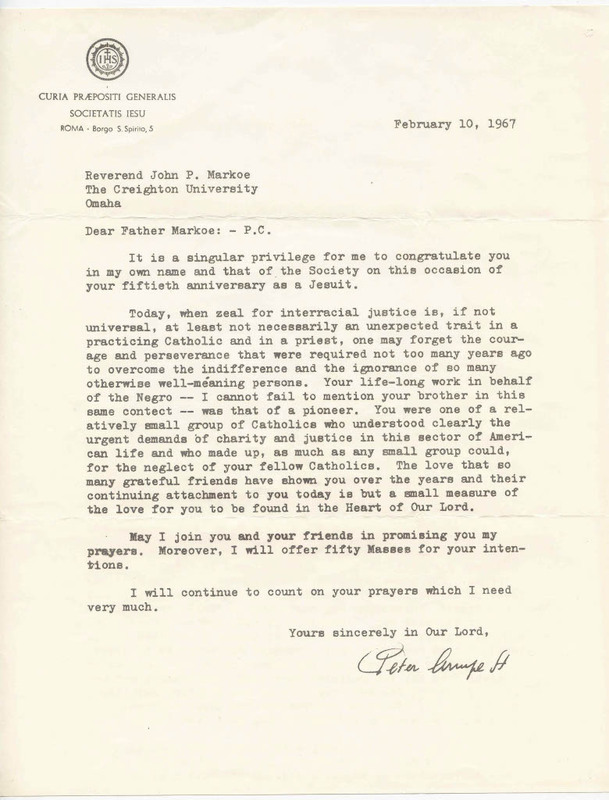Pedro Arrupe: The Turning Point
The installation of Pedro Arrupe, S.J. as Superior General of the Society of Jesus in 1965 proved to be a turning point for the order. Arrupe was a champion for social justice and solidarity with the poor and marginalized members of society. On February 10, 1967, Arrupe sent Fr. John Markoe a letter of congratulations for his 50th jubilee. He used the occasion to commend Markoe on his pioneering work for interracial justice. Arrupe praised Markoe for the “courage and perseverance” that his early support of civil rights required (Markoe Papers, B2 F1).
“Your life-long work on behalf of the Negro– I cannot fail to mention your brother in this same contect [sic]– was that of a pioneer. You were one of the relatively small group of Catholics who understood clearly the urgent demands of charity and justice in this sector of American life and who made up, as much as any small group could, for the neglect of your fellow Catholics” (Markoe Papers, B2 F1).
Then, in November of 1967, Arrupe sent out a letter entitled, “Interracial Apostolate” to every American Jesuit. In it, Arrupe lamented the fact that Jesuit activism on behalf of Black Americans had, up until that point, been implemented on an individual basis. He mentioned John Markoe by name as one of the “great pioneers” in service to Black Americans. He then issued an institutional call to action.
Acknowledging that racial discrimination had condemned a considerable percentage of Black Americans to a generational cycle of poverty, Arrupe encouraged American Jesuits to leave their white, middleclass comfort zone, recommit to the spirit of poverty, and minister to inner city communities. Arrupe would not coin the term “option for the poor” until 1968, but the well-known aspect of modern day Catholic social teaching was evident in his argument for the pursuit of racial justice and charity.
To ensure that his words created concrete change, Arrupe’s letter outlined ten policies ‘indicative of the course which Jesuit thought and action should take in attacking the twin evils of racial injustice and poverty in the United States” (Arrupe, 1967). He directed the American Jesuits to eliminate all forms of racial segregation or discrimination from their ministries, welcome Black parishioners, and foster vocations among Black Catholics. Jesuit high schools, colleges, and universities were to encourage Black student enrollment, establish scholarships and special programs to help disadvantaged Black students meet admission requirements, and recruit Black faculty members. He even stipulated that Jesuit institutions only contract out to businesses with fair employment practices. Finally, Arrupe urged the Jesuits to cooperate with religious and secular organizations making headway in the civil rights movement. Arrupe hoped that these policies would realign Jesuit “manpower and resources to meet the crying needs of our brothers in Christ who languish in racial degradation and inhuman poverty” (Arrupe, 1967).
For more, see Pedro Arrupe's "Interracial Apostolate."
